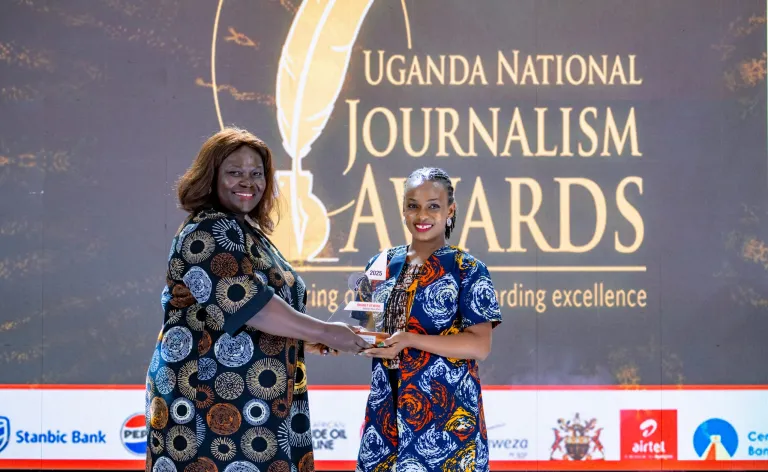Celebrating Uganda’s best storytellers: UNJA 2026 now open

Rhonet Atwiine of Solutions Now Africa, receiving the winning award for health reporting from ACME’s board chair, Prof. Emilly Maractho. Photo: ACME
Kampala, Uganda – Submissions are now open for the 12th Uganda National Journalism Awards (UNJA), an annual competition that recognises excellence and integrity in Ugandan media. The awards, organised by the African Centre for Media Excellence (ACME), invite entries from journalists and media houses across the country whose work was published or broadcast in 2025.
The awards remain one of the few national platforms where journalists’ work is scrutinised not for clicks or ratings, but for depth, accuracy, and public impact. ACME says the 2026 edition continues its mission of promoting high editorial standards in an increasingly fragmented media landscape.
What’s New in 2026
This year’s edition introduces two new categories.
The Rising Star Award for Early-Career Journalism targets journalists aged 25 and under, including students and independent digital storytellers; a sign that ACME is taking notice of the wave of new media voices emerging online.
Another addition, Digital Public Infrastructure Reporting, seeks work that explains how systems like national ID, e-government, and digital finance shape public life; a category reflecting the growing intersection of technology, governance, and rights.
Returning focus areas
The Climate Change Reporting category returns for a second year, supported by the Palladium Group Climate Smart Jobs programme, as environmental reporting continues to grow in importance.
Also back is the Regional Award for Reporting on the Productive Use of Solar Energy in Agriculture, open to journalists from Uganda, Kenya, and Tanzania.
At the institutional level, the Stanbic Shield of Journalism Award will once again recognise media organisations demonstrating consistent quality, independence, and public service value.
Who can enter
Entries are open to all journalists and content producers working in Uganda, whether freelancers, staff reporters, or independent creators, provided the work meets journalistic standards. Eligible pieces must have been published or broadcast between 1 January and 31 December 2025, with a submission deadline of 31 January 2026.
Each entrant can submit three to five stories in a single category. Entries published in local languages must include English translations, and paywalled or limited-access stories must be submitted as PDFs.
Why it matters
The Uganda National Journalism Awards have, over the past decade, become a mirror for the country’s evolving media landscape. While they celebrate excellence, they also expose the gaps, especially the pressures journalists face amid shrinking newsroom budgets, digital disruption, and threats to press freedom.
For many reporters, the awards offer recognition in a profession where hard-hitting work often goes unnoticed. Past winners have included investigative pieces that sparked public debate or policy change, and local stories that gave voice to marginalised communities.
Submission details
Entries must be submitted online via ACME’s website before midnight on 31 January 2026.
Further details, including category descriptions and submission forms, are available on the ACME website. Inquiries can be sent to awards@acme-ug.org.
Lucid News Africa analysis:
As Uganda’s media industry continues to navigate digital transitions, shrinking ad revenue, and political pressures, platforms like UNJA remain a rare space for professional validation. Yet, as some journalists note, awards alone can’t fix structural challenges from poor newsroom pay to ownership interference that affect the quality of reporting. Still, they offer one thing that matters: peer recognition for doing journalism that serves the public.




